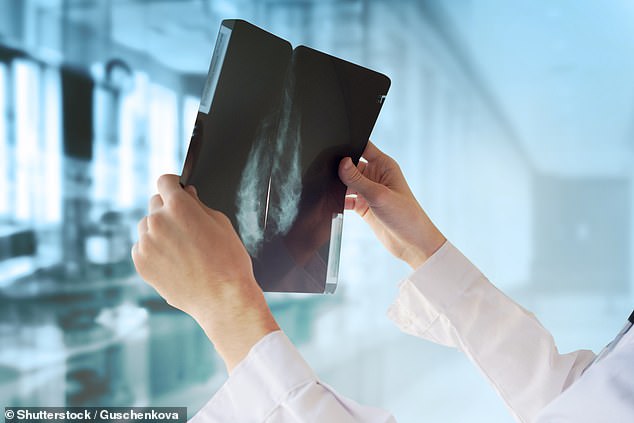[ad_1]
Women could get ‘two for one’ screening for breast cancer and heart problems using AI, a study suggests.
The technology can be trained to examine mammograms images to detect both tumours as well as gauging the potential risk of heart attacks and stroke.
Trials revealed the dual process performed just as well as individual screening, which indicated it could become a ‘cost-effective’ way of checking for both conditions.
Women registered with a GP in the UK are automatically invited for a mammogram every three years between the ages of 50 and 71.
Two X-rays are taken of each breast to look for signs of cancer. Researchers in Australia developed an AI algorithm based on images from 49,196 women enrolled on the Victoria Lifepool cohort registry, that country’s breast cancer research initiative.
The average age of the group was 59, with a third taking medication for high cholesterol and 27 per cent for high blood pressure.
The aim of the technology was to predict the risk of major cardiovascular disease, such as heart attacks and strokes.
Researchers said: ‘Many women undergo screening mammography in midlife when the risk of cardiovascular disease rises.

Women could get ‘two for one’ screening for breast cancer and heart problems using AI, a study suggests (stock photo)

The technology can be trained to examine mammograms images to detect both tumours as well as gauging the potential risk of heart attacks and stroke (stock photo)
‘Mammographic features, such as breast arterial calcification and tissue density, are associated with cardiovascular risk.
‘We developed and tested a deep learning algorithm for cardiovascular risk prediction based on routine mammography images.
‘A key advantage of the mammography model is that it did not require additional history taking or medical record data.’
During an average tracking period of almost nine years, 2,383 women had a heart attack, 731 had heart failure and 656 had a stroke.
The study, published in the journal Heart, found the algorithm performed just as well as other traditional calculators that use age and clinical variables to assess heart risks.
Researchers added: ‘A deep learning algorithm utilising routine mammograms and age shows promise as a cardiovascular risk prediction tool.
‘Mammography may offer a cost-effective ‘two for one’ opportunity to screen women for breast cancer and cardiovascular risk, enabling broader cardiovascular risk screening.’
The scientists conceded ‘the use of mammography images to predict cardiovascular risk is novel but the use of machine learning models to do cardiovascular risk prediction is gaining traction’.
[ad_2]
This article was originally published by a www.dailymail.co.uk . Read the Original article here. .

